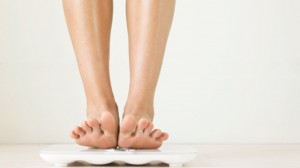 With the recent controversy surrounding Rachel Frederickson’s extreme weight loss on The Biggest Loser, it’s time to shed light on the proper (and safe) way to lose weight. For those unfamiliar with reality television, The Biggest Loser centers around overweight contestants attempting to lose weight to win a cash prize. The winner, whoever loses the highest percentage of weight, is given the title “the Biggest Loser,” along with a cool cash prize of a quarter million dollars. This past season’s winner, Rachel Frederickson, has stirred up much press when she dropped 60% of her bodyweight, going from an original weight of 260 lbs. down to a meager 105 in roughly 7 months—a new record for the show.
With the recent controversy surrounding Rachel Frederickson’s extreme weight loss on The Biggest Loser, it’s time to shed light on the proper (and safe) way to lose weight. For those unfamiliar with reality television, The Biggest Loser centers around overweight contestants attempting to lose weight to win a cash prize. The winner, whoever loses the highest percentage of weight, is given the title “the Biggest Loser,” along with a cool cash prize of a quarter million dollars. This past season’s winner, Rachel Frederickson, has stirred up much press when she dropped 60% of her bodyweight, going from an original weight of 260 lbs. down to a meager 105 in roughly 7 months—a new record for the show.
Rachel reportedly exercised for at least six hours a day and ate a diet of only 1,600 calories per day. Despite her claims that this workout/diet routine mimicked that of an athlete—did she go too far? Perhaps. This extreme decrease in weight certainly points to unhealthy habits. Each body is unique and it’s important to be aware of what you can and cannot handle when trying to lose some pounds. WebMD advises aiming to lose 1-2 pounds per week—if you’re looking to shed weight—anything extremely more can be too much, too fast. Fad diets are inadvisable, as they can often be unhealthy and don’t usually last. Burning 500 more calories than you eat every day for a week should be sufficient to help you lose 1-2 pounds safely. Doing slightly more to lose weight, such as eating 1,200 calories a day and exercising for one hour each day could help you lose 3 or more pounds a week—but this can be inadvisable for many people, depending on their unique health conditions.
Eating healthily is a key component to losing weight properly. Focusing on fruits, vegetables, egg whites, soy products, poultry, fish, nonfat dairy, and 95% lean meat is a great start. Drinking plenty of water, eradicating tempting foods from your home, not skipping meals, and staying busy are all other tips to help you reach your goal. While it is unclear if Rachel Frederickson lost weight healthily, it is important to monitor the limits of your body closely. Consulting with your doctor and devising a healthy weight loss or weight management plan will help ensure you’re losing the weight in a proper and safe way.

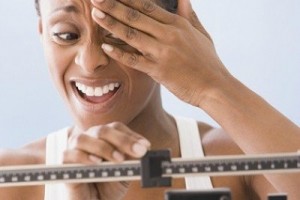 A recent study published by researchers at Duke University highlighted the fact that some populations of women are more receptive to weight-management interventions than programs advertising weight loss. Weight loss is difficult across all populations and many programs aimed at reducing the pounds may end up providing only a temporary reprieve. As weight gain and obesity are ever-increasing concerns, some researchers have tried to tackle this problem from another angle. Instead of designing weight loss programs, health enthusiasts should focus on weight management initiatives for certain populations.
A recent study published by researchers at Duke University highlighted the fact that some populations of women are more receptive to weight-management interventions than programs advertising weight loss. Weight loss is difficult across all populations and many programs aimed at reducing the pounds may end up providing only a temporary reprieve. As weight gain and obesity are ever-increasing concerns, some researchers have tried to tackle this problem from another angle. Instead of designing weight loss programs, health enthusiasts should focus on weight management initiatives for certain populations. The FDA recently approved the first weight-loss drug, Belviq (lorcaserin hydrochloride), in 13 years. Arena Pharmaceuticals of San Diego developed the pill to help people lose 3-4% of their body weight when coupled with exercise and a healthy diet. The FDA approved the pill for obese people (BMI over 30) and some overweight people (BMI over 27) who suffer from high blood pressure, high cholesterol, and type 2 diabetes.
The FDA recently approved the first weight-loss drug, Belviq (lorcaserin hydrochloride), in 13 years. Arena Pharmaceuticals of San Diego developed the pill to help people lose 3-4% of their body weight when coupled with exercise and a healthy diet. The FDA approved the pill for obese people (BMI over 30) and some overweight people (BMI over 27) who suffer from high blood pressure, high cholesterol, and type 2 diabetes.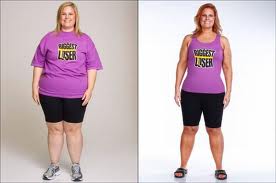 Interesting research on the outcomes of "The Biggest Loser" reality TV show highlight important news for diabetics! According to Robert Huizenga, MD , the medical advisor for the show, diabetic and prediabetic contestants were off medications within a few weeks of starting the intensive exercise regimen that are part of the intervention. The contestants who were part of the study, averaged about 5-6 hours of TV watching a day and they were exercising about 120 minutes per week BEFORE they went on the show. The exercise regimen while on the show comprised about 4 hours of daily exercise that included intense aerobics and resistance training for 2 hours and another 2 hours of moderate aerobics.
Interesting research on the outcomes of "The Biggest Loser" reality TV show highlight important news for diabetics! According to Robert Huizenga, MD , the medical advisor for the show, diabetic and prediabetic contestants were off medications within a few weeks of starting the intensive exercise regimen that are part of the intervention. The contestants who were part of the study, averaged about 5-6 hours of TV watching a day and they were exercising about 120 minutes per week BEFORE they went on the show. The exercise regimen while on the show comprised about 4 hours of daily exercise that included intense aerobics and resistance training for 2 hours and another 2 hours of moderate aerobics. Recently Miley Cyrus has been touting a gluten free diet as a way to lose weight. Is this true or just another celebrity fad? Gluten is a protein present in foods including wheat, rye, oats, and barley but may also be found in everyday products such as medicines, vitamins, and even lip balms. There's absolutely nothing wrong with eating gluten unless you have celiac disease, or gluten sensitive enteropathy (GSE), an autoimmune disease that damages the small intestine and interferes with absorption of nutrients from food. If you are sensitive to gluten, the body produces an abnormal immune response to it, attacking the lining of small intestine where digestion takes place. This leads to the symptoms of celiac disease: • abdominal bloating and pain • chronic diarrhea • vomiting • constipation • pale, foul-smelling, or fatty stool • weight loss About 1% of the population has GSE. But there may be another 9% or so who have what is called gluten sensitivity or gluten intolerance. These people may have similar symptoms to those with GSE but do not show the same damage to the bowel as those with GSE. The only treatment for celiac disease is a lifelong, gluten-free diet. But can it cause you to lose weight? The answer is complicated. Studies have shown that patients with GSE who were underweight gained weight on a gluten-free diet. Those with GSE and obesity tended to lose weight after starting a gluten-free diet. What about people who don't have GSE? Celebrities have touted a gluten-free diet as a way to lose weight. Proponents hype it as a healthier way to eat. They claim it improves sleep, increases energy, and clears skin. Some go so far as to say it helps those with autism and rheumatoid arthritis. But Dee Sandquist, MS, RD, a spokeswoman for the Academy of Nutrition and Dietetics, who also happens to have celiac disease, says: There is nothing magical about eliminating gluten that will improve your health or enhance weight loss unless you are intolerant to gluten. The academy points out that "Research on individuals with celiac disease reports that long-term compliance with a gluten-free dietary pattern improves outcomes related to bone density, iron deficiency anemia, villous atrophy, gastrointestinal and neurological symptoms, pregnancy outcomes and quality of life." One problem is the fact that many people with GSE don't even know that they have the disease, and those with gluten intolerance are less likely to be diagnosed. Researchers conclude that there is no scientific evidence supporting the alleged benefit that a gluten-free diet will promote weight loss and that adherence to the gluten-free dietary pattern may actually result in a diet that is low in carbohydrates, fiber and important vitamins. Many confuse a gluten-free diet with a low-carb diet (which can promote weight loss). A gluten-free diet eliminates foods such as bread and pasta, it doesn't eliminate other high-carb foods such as rice, beans and corn. The popularity of gluten-free diets has lead to an explosion of gluten-free food availability and a financially growing industry that is expected to exceed $5 billion by 2015! This is great if you need to be on the diet. However, people need to be aware that these are not low-calorie foods! Some prepared foods have additional fat and sugar added and mixed into substitute flours such as white rice flour or potato starch to make them more palatable. A gluten-free diet is not a panacea for weight loss. It is, however, an important diet for those who suffer from GSE or intolerance.
Recently Miley Cyrus has been touting a gluten free diet as a way to lose weight. Is this true or just another celebrity fad? Gluten is a protein present in foods including wheat, rye, oats, and barley but may also be found in everyday products such as medicines, vitamins, and even lip balms. There's absolutely nothing wrong with eating gluten unless you have celiac disease, or gluten sensitive enteropathy (GSE), an autoimmune disease that damages the small intestine and interferes with absorption of nutrients from food. If you are sensitive to gluten, the body produces an abnormal immune response to it, attacking the lining of small intestine where digestion takes place. This leads to the symptoms of celiac disease: • abdominal bloating and pain • chronic diarrhea • vomiting • constipation • pale, foul-smelling, or fatty stool • weight loss About 1% of the population has GSE. But there may be another 9% or so who have what is called gluten sensitivity or gluten intolerance. These people may have similar symptoms to those with GSE but do not show the same damage to the bowel as those with GSE. The only treatment for celiac disease is a lifelong, gluten-free diet. But can it cause you to lose weight? The answer is complicated. Studies have shown that patients with GSE who were underweight gained weight on a gluten-free diet. Those with GSE and obesity tended to lose weight after starting a gluten-free diet. What about people who don't have GSE? Celebrities have touted a gluten-free diet as a way to lose weight. Proponents hype it as a healthier way to eat. They claim it improves sleep, increases energy, and clears skin. Some go so far as to say it helps those with autism and rheumatoid arthritis. But Dee Sandquist, MS, RD, a spokeswoman for the Academy of Nutrition and Dietetics, who also happens to have celiac disease, says: There is nothing magical about eliminating gluten that will improve your health or enhance weight loss unless you are intolerant to gluten. The academy points out that "Research on individuals with celiac disease reports that long-term compliance with a gluten-free dietary pattern improves outcomes related to bone density, iron deficiency anemia, villous atrophy, gastrointestinal and neurological symptoms, pregnancy outcomes and quality of life." One problem is the fact that many people with GSE don't even know that they have the disease, and those with gluten intolerance are less likely to be diagnosed. Researchers conclude that there is no scientific evidence supporting the alleged benefit that a gluten-free diet will promote weight loss and that adherence to the gluten-free dietary pattern may actually result in a diet that is low in carbohydrates, fiber and important vitamins. Many confuse a gluten-free diet with a low-carb diet (which can promote weight loss). A gluten-free diet eliminates foods such as bread and pasta, it doesn't eliminate other high-carb foods such as rice, beans and corn. The popularity of gluten-free diets has lead to an explosion of gluten-free food availability and a financially growing industry that is expected to exceed $5 billion by 2015! This is great if you need to be on the diet. However, people need to be aware that these are not low-calorie foods! Some prepared foods have additional fat and sugar added and mixed into substitute flours such as white rice flour or potato starch to make them more palatable. A gluten-free diet is not a panacea for weight loss. It is, however, an important diet for those who suffer from GSE or intolerance. Women typically find it harder to lose weight and inches than men. This, in part, is due to the fact that men have more lean muscle mass and a higher resting metabolic rate. Another issue that makes weigh loss challenging for females: women store fat differently from men--more of it goes to their thighs, buttocks, and hips, where it can be harder to shed. Finally, female hormones promote the storage of calories as fat, and fat takes up more space than muscle.
Women typically find it harder to lose weight and inches than men. This, in part, is due to the fact that men have more lean muscle mass and a higher resting metabolic rate. Another issue that makes weigh loss challenging for females: women store fat differently from men--more of it goes to their thighs, buttocks, and hips, where it can be harder to shed. Finally, female hormones promote the storage of calories as fat, and fat takes up more space than muscle.

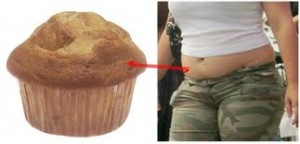 Munching more unprocessed plant foods may help keep the middle-aged bulge away (AKA muffin top) , a new study suggests. On the other hand, meat, french fries and sugar-sweetened drinks can help pack on the pounds. The findings suggest that the types of food you choose, not just calories, are important for avoiding age-related weight gain.
Munching more unprocessed plant foods may help keep the middle-aged bulge away (AKA muffin top) , a new study suggests. On the other hand, meat, french fries and sugar-sweetened drinks can help pack on the pounds. The findings suggest that the types of food you choose, not just calories, are important for avoiding age-related weight gain.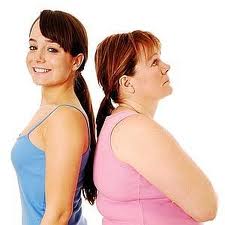 Why are some people obese while others are lean? Obese people must make poor eating choices, but could there be a physiological basis for those poor choices? A new study reveals that obese and lean people make decisions about short-term versus long-term rewards differently and have physical differences in their brains. Surprisingly, some of these behavioral and physical differences are found only in women.
Why are some people obese while others are lean? Obese people must make poor eating choices, but could there be a physiological basis for those poor choices? A new study reveals that obese and lean people make decisions about short-term versus long-term rewards differently and have physical differences in their brains. Surprisingly, some of these behavioral and physical differences are found only in women.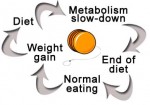 Have you been losing weight and despite staying on your diet and exercising, your weight suddenly stays the same? Don't get discouraged, it's normal for weight loss to slow down and even stop. This phenomenon is called the "weight-loss plateau" and it's more common than you think. Even the best planned weight loss program can become stalled.
Have you been losing weight and despite staying on your diet and exercising, your weight suddenly stays the same? Don't get discouraged, it's normal for weight loss to slow down and even stop. This phenomenon is called the "weight-loss plateau" and it's more common than you think. Even the best planned weight loss program can become stalled.